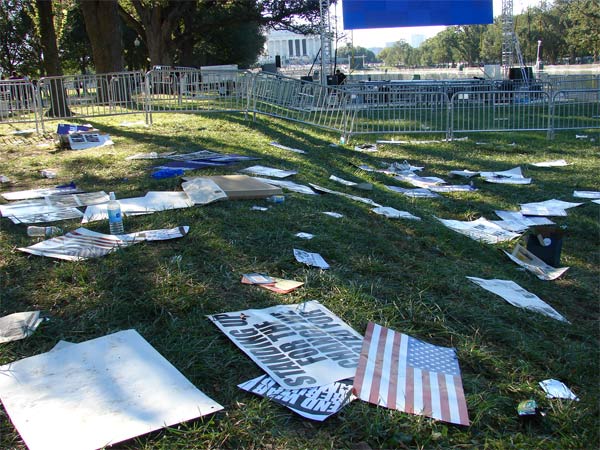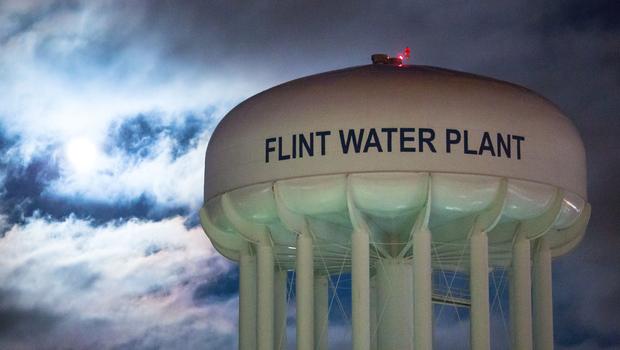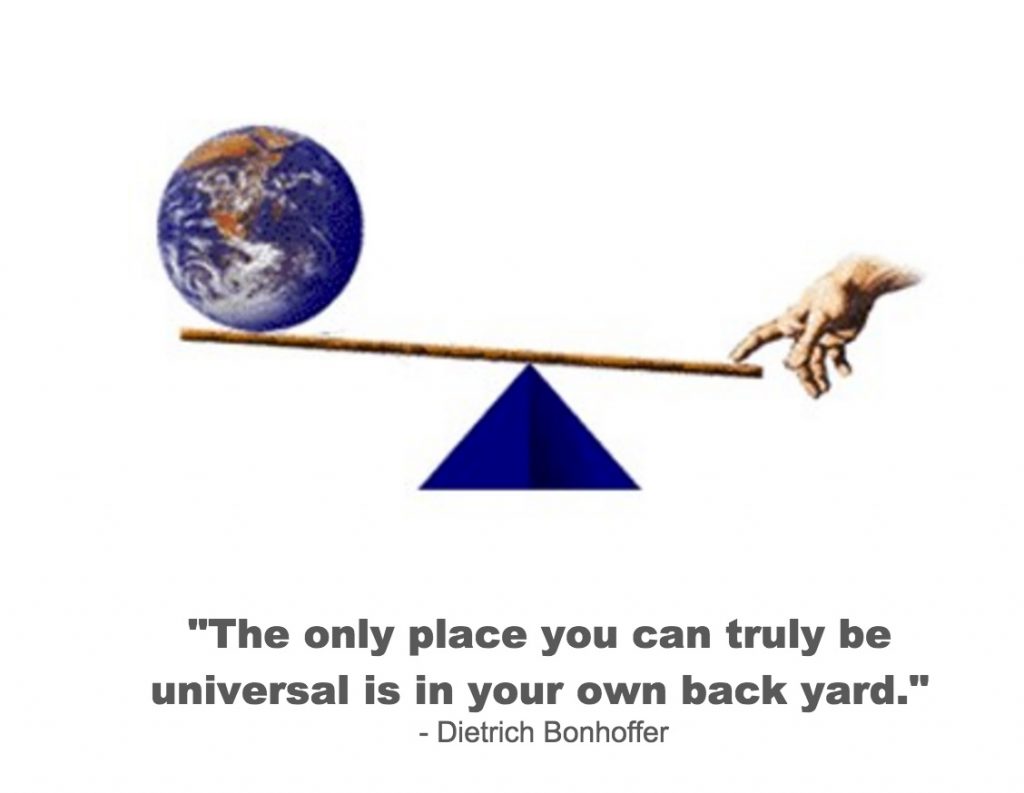Citizen Action
Do You Have an “After-March” Strategy for Change?
Three events this week can help make you a better activist…year round
– A high-level discussion about Civil Disobedience as a tactic for
social change
– A forum with Flint Activists on the front lines of the nation's best known
environmental justice fight
– A full day of skills and information workshops featuring local experts
and elected officials
Don't Miss These One-Of-A- Kind Opportunities
1. Get Inspired by Flint National Heroes Melissa Mays and Nayyirah Shariff.
These are the Lois Gibbs and ErinBrockovichs of our age.

Flint is our Love Canal.
This is their only stop in Texas.
You have TWO opportunities for quality time with them.
Thursday, Jan 26th, from 7 to 9 pm at the beautiful Mountain View Performance Hall, they'll be "Exposing the Poison Water and Toxic Government" that caused the Flint Scandal and then joining local lead activists from West Dallas and Frisco. This evening with them is free and open to the public.
On Saturday, January 28th at UTA as part of our 1-Day University Of Change they'll both be doing a workshop on "How Flint was Exposed." Limited seating to spend up close and personal time with national environmental justice heroes. Register here.
There are still arrests being made in Flint and Michigan because of this scandal. There is still a problem with lead in Dallas. Come hear why the two problems are connected.
________________________________________________________
2. See the Public Premier of the Trailer for a New Film on Flint – "Bigger than Water" co-produced by Earth Day Texas
The same team that produced "Racing Extinction" is now turning its attention to the public health crisis in Flint. This is the first public showing of their trailer promoting "Bigger than Water," expected to be in theatrical release soon. It serves as an introduction to the Women from Flint, Thursday at 7 at the Mountain View Performance Hall.
______________________________________________________________
3. DRONES!
Come see the future of citizen air monitoring. If the weather holds, Cap't Dave Schafer from UTD's drone fleet will be giving a live demo flight right after the "High Tech Tools for Citizens" workshop at Saturday's 1-Day University of Change. In addition, he'll have the better part of his fleet on display during the day for you to look at up close. UTD's drones have been used in many air quality studies, including EDF's recent one in the Barnett Shale gas patch. Downwinders is working in collaboration with UTD to develop our own North Texas CLEAN Air Force drone capacity.
Register herefor the workshops and the drone demo on Saturday, January 28th, beginning at 9:30 am and ending by 5:30 – 6:00 pm.
(It's a secure Click and Pledge pay portal established just for this event, so the $35 registration is called a "donation." Just click on the $35 button, fill out the credit card info and you're done)
____________________________________________________________
4. ONE NIGHT ONLY: Sixty Years of Local Civil Disobedients on a Single Dallas Stage
Peter Johnson was there on the Edmund Pettus Bridge in Selma in 1965.
Mavis Belisle organized what is still the single largest act of Civil Disobedience in Texas history at the Comanche Peak nuclear plant.
Cory Troiani and Ron Seifert have been on the front lines of the movement to stop new fossil fuel pipelines.
LaSadion Anthony is organizing local anti-police brutality protests that challenge the status quo AND traditional approaches to civil disobedience.
All of these remarkable people will be talking about how and when civil disobedience is used effectively – or not – after a screening of "Above All Else" about the East Texas Keystone Pipeline blockade. Be part of the discussion.
At the Angelika Theater @ Mockingbird and Central, Tuesday, January 24th 7 to 9 pm.
ABSOLUTELY FREE AND OPEN TO THE PUBLIC
_________________________________________________________________
5. Face Time with Local Elected Officials Who Actually Care About Quality of Life Goals
As part of our 1-Day University of Change on Saturday January 28th, we're hosting a special lunchtime discussion with local officials who've been outspoken in their defense of clean air and water, sustainability, and sane transportation options.
So far, Dallas County Commissioner Theresa Daniel and Dallas Council member Sandy Greyson have agreed to participate. This is your chance to ask them about local strategies to fight hostile state and federal governments and tell them what you think they should do.
Register for the 1-Day University of Change here. $35 for the whole day – includes lunch. (It's a secure Click and Pledge pay portal established just for this event, so the $35 registration is called a "donation." Just click on the $35 button, fill out the credit card info and you're done)
Why Flint Matters to Us: South Dallas “High” Lead Levels Six Times Above National Average
 Discrimination can kill in lots of ways. In Dallas, one of the ways has been lead poisoning.
Discrimination can kill in lots of ways. In Dallas, one of the ways has been lead poisoning.
It may be hard to imagine now, but up until the mid-1980's there were three lead smelters operating right across the street from homes in Dallas. Those homes were all south of the Trinity River: in West Dallas and Cadillac Heights. Along with all the other things and people the city considered undesirable, the poor, the black, the Mexicans and the lead smelters were all squeezed in close to the Trinity River.
Lead contamination permeated the neighborhoods night and day, year-round. Smokestacks let loose tons of fine lead particles and other toxins directly into the air residents breathed – every day. The heavier particles created fallout zones where the soil built-up layers of lead in the ground – the same ground people were using to grow their own food. Because the lead smelters "recycled" old batteries by busting them open for their lead, the discarded pieces of contaminated battery casings were used for paving neighborhood streets or as fill, along with the cooked smelter waste "slag." Sometimes this waste was used for "agricultural supplements." Often it was just dumped in near-by vacant lots. West Dallas and Cadillac Heights residents employed by the smelters were covered were lead dust when they got home and played with their children. In doing their laundry, their spouses got exposed as well.
Smelters were not the only sources of lead poisoning. Household paint was doused in it and every car and truck ran on leaded gasoline. But none of these produced the dense clouds of lead, or the constant exposure to it across a variety of "pathways" that the operation of a neighborhood lead factory did. Thousands of African-American and Mexican-American families' lives, entire generations of Dallasites, were wrecked by the pollution from the smelters.
But the last of those smelters closed more than 30 years ago, so why is this ancient environmental justice history lesson important now? Because their legacy is still haunting Dallas neighborhoods.
Take a look at this story on lead contamination that the Reuters news agency recently did. It compares the results of child blood lead testing by Zip Codes across the country to the more alarming levels of lead in Flint. As it turns out, there are lots of places in the nation still suffering high rates of lead contamination – including Dallas. There's an interactive map that allows you to zoom in on a specific Zip Code and find out what percentage of the blood tests were considered "high."
Over 15% of the child blood tests in Dallas Zip Code 75215, the site of the two former Cadillac Heights smelters, were “high” for lead – as high,or higher than the lead levels of affected Flint residents. The Center for Disease Control estimates the national average is 2.5.%. In other words, South Dallas kids are suffering six times the national rate of severe lead poisoning. Residents in North Oak Cliff and West Dallas where RSR was located – 75208 and 75212 – had between 7 and 10% of their child blood tests come in as high or higher than Flint, or 3 to 4 times higher than the national average.
Yes, there's more older housing stock likely to still have lead paint in those neighborhoods, and yes, because of lack lf new development, the soil in those neighborhoods may still contain lead gasoline fallout. But it's more than just coincidence that, in 2017, these two predominantly minority communities still have the highest blood lead levels in their children of any Zip Codes in North Texas.
Lead is an insidious poison. It not only harms you physically with organ damage on many fronts, it also handicaps a person emotionally and intellectually. We know even low levels of lead exposures cause learning disabilities and anti-social behavior from the very beginning of life. There is now substantial evidence to believe lead exposure is directly tied to your chances of engaging in criminal behavior, that is, the more you're exposed to lead, the more likely it is you'll commit a crime. The explosive crime wave of the 1960's – 80s, along with the subsequent dramatic drop, tracks almost precisely with the peaks and decline in lead exposure among residents in urban America over that same period.
In creating lead pollution zones in minority neighborhoods around its smelters, Dallas condemned its black and brown residents to more than just physical hardships –they reshaped the entire culture and destiny of those communities. They made the children in these neighborhoods less likely to be able to learn and more likely to be arrested. What were interpreted as a pejorative cultural stereotypes by the White Establishment, were in fact the result of large-scale industrial poisoning by the White Establishment. Proximity to lead meant less options, less choices – because you started out with less, because the lead had robbed you of your potential even before you knew you had it. Once taken, it can never be given back. What kind of reparations can pay for that?
But this is a preventable fate. We can clean-up lead. We can take it out of the community. Out of the paint. Out of the soil. We can stop the stealing of souls by doing good old-fashioned remedial physical cleaning. It just takes the political power to bring that cleaning to West Dallas and Cadillac Heights.
This is one more reason why the visit of Flint activists Melissa Mays and Nayyirah Shariff is important. These women took it upon themselves to do their own testing, and then use those tests to organize a plan to quit being poisoned. The ways lead can reach inside of you are different in Flint than Dallas, but the result is the same. They have some valuable lessons about how to put the status quo on its heels. This is their first Texas trip. Come out and hear from two hardcore environmental justice advocates.
Recognizing its Black and Brown residents are up to six times more at risk of having high lead levels, Dallas should be more committed to getting the lead out. Failure to do so is just one more legacy of the institutional racism that still scars the city on MLK Day 2017. But it's a failure that can be remedied.
Be Where Your Feet Are
Based on position papers, advisors, and now job offers, it's hard to overestimate the harm to the environment that can and will be done by a Trump Administration. Your first response may be to already feel defeated by the enormity of the challenges now facing us.
Don't let those feelings get the best of you.
What happened on Election Day was unexpected, but history is always so.Consider the odds against a black man named Hussein winning the Presidency in 2008. The unpredictable nature of history is what gives us hope. This moment won't last. The future isn't written yet. Even now there are important tipping points waiting for you to make them happen. But you must show-up.
We don't say this as Pollyannas unschooled in the difficulties of working in a hostile political atmosphere. We say it BECAUSE we've worked in the political wilderness of Texas for over twenty years and won some of our biggest victories when awful political circumstances would tell you our chances ranged from slim to none.
Certainly there'll be national fights that have to be fought. Progress will be measured in how much we save as well as how much we advance. But the model of change Downwinders at Risk has followed since its founding, with its emphasis on local action, is more relevant than ever.
We were already committed to building more local movement "infrastructure" before the elections, but those efforts seem doubly important now.
Here are some examples of what we mean:
Our next "Root and Branch Revue" for environmental activists this coming January 24th-28th We're going to be screening a film, sponsoring discussions, and hosting workshops – all with the aim of making you a better activist. This year's featured guests will be the women from Flint, Michigan who exposed that public health scandal by doing their own water testing.
Our work in building the North Texas Air Research Consortium with local universities and municipalities This new high-tech network, co-founded by Downwinders, will provide the public with more and better information about air quality than either the state or federal government is even thinking about. Downwinders' part of this larger effort is our "North Texas CLEAN Air Force" that will use drones and sensors for mobile monitoring to fill data gaps, study specific facilities, or respond to accidents.
Our semester-long "College for Constructive Hell-Raising" Twice-a-month evening class from January to May that will offer intensive training in traditional community organizing techniques as well as an opportunity to hear stories from 50 years of social justice history in DFW. Our goal is to graduate students who will produce positive change across a variety of local issues and causes.
All of these efforts concentrate on building community among the like-minded, not just online, but in person. We need strong networks and good relationships with our peers to survive and thrive, so if you feel impotent to do much about DC or Austin, get out of the house and vote with your feet in your own backyard. This is where you can do the most good.
Here's a last unlikely scenario to consider:
A local group of environmentalists whose volunteer board membership never numbers more than a dozen, and who receive no national or state support, manages to not only survive for two decades, but fields the only full-time staff person devoted to clean air in DFW and becomes the leading protector of regional air quality, winning battles with sheer persistence as much as anything else.
That's the unexpected history that's happened because of support like yours in times like these. Please stick with us, and we promise we'll keep fighting for, and with, you.
You can make your secure online tax deductible contribution here, or send a check to PO Box 763844 Dallas, TX 75376.
Thanks for your continued support. See you in the New Year – and New Era.
Jim Schermbeck, Director
Tamera Bounds, Chair, Downwinders at Risk Education Fund
Wondering How to Respond? Look to Reagan-Era AIDS Activists
 At first blush it might seem strange to recommend Trump-era environmentalists undertake a crash course on Reagan-era AIDS activism, but this review of David France's book in the Washington Post makes a good case.
At first blush it might seem strange to recommend Trump-era environmentalists undertake a crash course on Reagan-era AIDS activism, but this review of David France's book in the Washington Post makes a good case.
Frances' “How to Survive a Plague: The Inside Story of How Citizens and Science Tamed AIDS" is based on the 2012 documentary of the same name. Faced with political opposition based on cultural shaming at the highest levels of government using ideological fig leafs, the LGBT community in the 1980's had to fight for the very scientific legitimacy of the disease itself. It then had to organize its own treatment, and fight to fund new research. It had to fight the idea of AIDS as a "gay curse," educate about the new threat to everyone, and remind mainstream America the problem was closer than just the nearest gay bar downtown.
To some of us, that's a pretty good description of the war against climate change activism we find ourselves confronting now.
Just like AIDS deniers, there are climate change deniers. They don't even want to grant the most important fate-changing phenomenon of our times the legitimacy of reality.
At this point opposition to climate change is more cultural than political. It's a middle finger to the pointy-headed scientists and government regulators just looking to make a buck off selling the End of the World.
In the 1980's, survival of the LGBT community motivated a spectrum of responses to an uncharitable status quo. To paraphrase Dr. Johnson, death has a way of focusing the mind. Everything from civil disobedience, to traditional lobbying, to the improbable idea of a giant silent quilt bearing profound testimony on the National Mall. Activists had to fight to even get on the radar of Big Science and Big Government. They did their own science and their own organizing. And from those contentious times grew something remarkable that would flourish and lead to the current status quo – marriage equality, anti-discrimination laws, huge national boycotts pushing back against attempts to re-institutionalize prejudice.
Here's the nut graph of the piece:
"The book is also something of a how-to manual for activism. ACT UP agitators shut down the FDA, blocked access to drugmakers’ buildings, and even placed an enormous condom over Helms’s house. Their efforts built new and lasting bridges among activists, scientists and policy wonks while establishing a blueprint for social change. France was emphatic when he told me that the lesson from the AIDS era is a sweeping one: Against all odds, he declared, “empowerment and victory are possible.” That’s an important one to recall at the dawn of a Trump administration."
Survival is on the line again but there's a President-elect already on record as saying climate change is a hoax. What's the appropriate responses to such a basic level of uncomprehension? We're about to find out, but maybe we could save some time by going back and absorbing the lessons of the people who knew what it was like to fight with everything on the line and no friends in high places.
Our First Success in the Trump Era: The College for Constructive Hell-Raising Reaches Full Capacity 10 Days Early
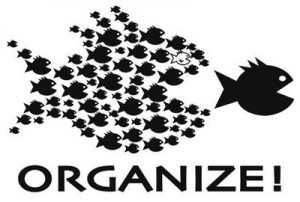 On Monday, Downwinders sent out acceptance letters to 15 DFW residents who'd applied to become members of our very first College of Constructive Hell-Raising. Since 15 students is all we have room for this initial year, that means we reached full capacity a whole ten days before the deadline for applications on December 1st. And there's even a small waiting list now. There might be some interest in this community organizing stuff after all.
On Monday, Downwinders sent out acceptance letters to 15 DFW residents who'd applied to become members of our very first College of Constructive Hell-Raising. Since 15 students is all we have room for this initial year, that means we reached full capacity a whole ten days before the deadline for applications on December 1st. And there's even a small waiting list now. There might be some interest in this community organizing stuff after all.
The successful applicants range in age, experience and background. There are college students as well as retirees. There's a PhD candidate in environmental philosophy and the founder of a social justice choir. One has been deeply involved in South Dallas criminal justice issues while another is a High School teacher with no organizing experience at all. One founded a thriving regional business while another has already run for local political office. We have DREAM generation activists, urban ag advocates, prairie protectionists, and International Rescue Committee volunteers. If you want a reason to feel optimistic about the future, this class is a good place to start.
Plans were underway for the College before this election year, but there's no denying those plans seem prescient now. We're going to need better-trained activists and we're going to need better networks.
The College is just one of the ways Downwinders is trying to build more local "capacity" for DFW activists of all kinds. More resources, more opportunities to learn, more ways to sharpen your skills. Another is coming up soon: Our Root and Branch Revue from Janaury 24th thru the 28th is aimed at making you a better activist. This year's featured guests will be the women from Flint, Michigan who blew the whistle on that public health scandal by doing their own water testing and organizing around the result. The message: We all live in Flint now. Root and Branch will again feature a whole Saturday of workshops, as well as a film screening, another edition of "Get Polluted with Bar Politics," and more. Details coming soon.
If you're kicking yourself over not signing-up for the 2017 College semester in time, not to worry. We're going to be doing this again in the spring of 2018. Meanwhile, keep track of the class and the CCHR at the College's own Facebook page.
“Never give in, never give in, never, never, never, never”
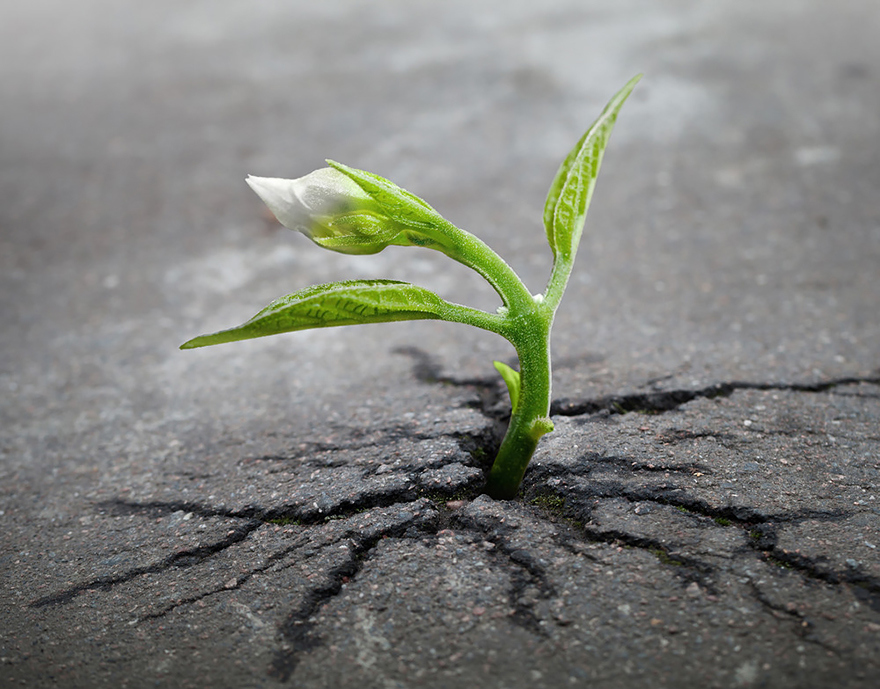 Those words from Winston Churchill hung on a hand-drawn, four-foot long poster above the door of the Downwinders' first office in central Cedar Hill throughout the 1990's.
Those words from Winston Churchill hung on a hand-drawn, four-foot long poster above the door of the Downwinders' first office in central Cedar Hill throughout the 1990's.
They were still there in the fall of 1999 when we lost our six-year, six-fgure fight to keep TXI from getting a state permit to burn hazardous waste in obsolete kilns – more than 10 years after they'd already begun the practice.
Both the quote and office were long gone in 2006 when we started our Green Cement campaign to try to stop the burning of hazardous waste through local procurement ordinances.
By 2008, when TXI announced they were indeed going to stop burning waste, the sign itself was just a memory. But we never, never, never, never gave in. Despite the election of W as Governor, and then president. Despite both a hostile state and federal government. Despite getting our ass kicked. Hard. We dusted ourselves off, got back up, and started again.
Our fight over waste-burning took 14 years, and spanned three different presidential administrations.
No doubt about it. We all just got our ass kicked yesterday. Hard. Our collective butt is red and sore and it's perfectly natural not to want to put it in a position to be kicked again, to avert another possible ass-kicking, to avoid conflict for awhile. But you must resist that urge. Instead, we have to regroup and keep fighting. Hard.
There are some epic battles coming up. Their results are not decided yet. We need your participation to stand a chance. Unlike elections, we don't need 51% to win many of them. Just a critical mass of people like you. Yes, there's always the possibility of getting your ass kicked again. But there's also the possibility of you kicking some ass.
And if you want to learn how to be a better ass kicker, then we suggest this bit of training.
The point is, go ahead and lick your wounds however you must, but don't check out of political action because of the election results this year. We need you back here on the front lines asap, now more than ever, because the challenge is greater than ever. As one of our College of Constructive Hell-Raising guest lecturers, Changa Masomakalia, wrote in a post last night:
This is your Reconstruction period.
This is your Civil Rights Movement.
This is your moment.
What are you going to do with it?
College Close-Up: The Bois D’Arc Patriots of Old East Dallas
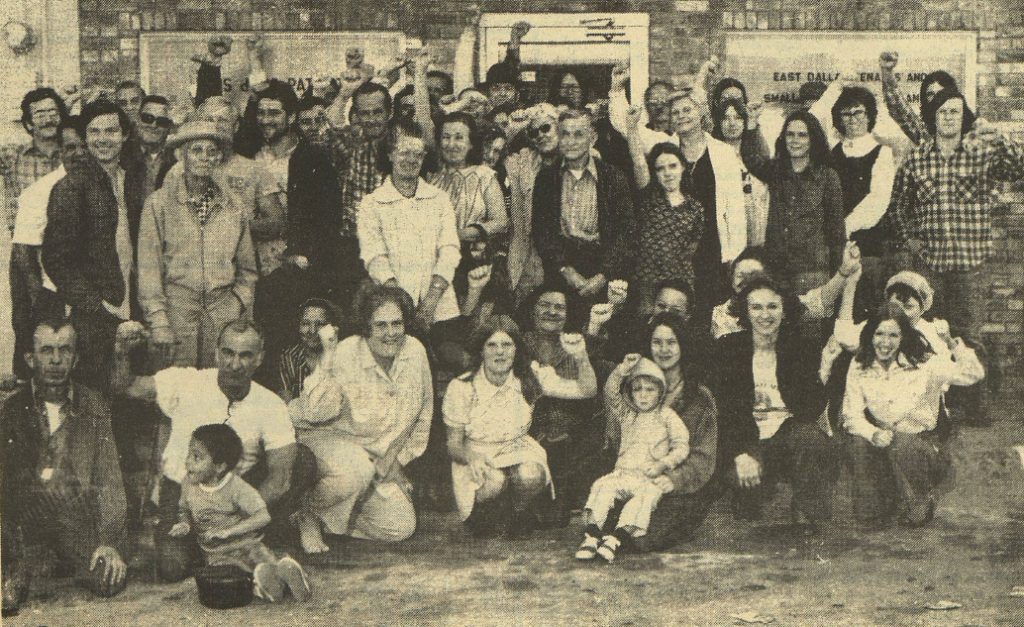 This picture is from the mid 1970's.
This picture is from the mid 1970's.
It features members of the East Dallas Tenants and Small Homeowners' Alliance, and a very influential group of activists who organized them called the Bois D'Arc Patriots.
Named after the native tree renowned for its durability and strength, the one Comanches used to carve their bows from, the Patriots were committed to representing the unrepresented in Dallas.
Specifically, they fought on behalf of East Dallas residents who were being forced out of their homes by gentrification and bad city planning. Sound familiar?
During a high-profile fight over slumlords, the Patriots released a box of cockroaches during a Dallas City Council meeting in order to bring home the conditions residents were experiencing – as well as comment on the Council's inaction.
Dallas native John Fullinwider was an original member of the Patriots. He's gone on to become an acclaimed DISD educator as well as remain a mainstay in Dallas community politics, including being an advisor to Mothers Against Police Brutality.
He's also one of nine Guest Lecturers participating in Downwinders at Risk's College of Constructive Hell-Raising, a continuing ed course on community organizing beginning in January.
This course is designed for anyone who wants to learn more about how to be an effective advocate, as well as know how others in DFW have forged productive social change despite the odds.
The College of Constructive Hell-Raising offers the first opportunity for DFW activists to receive professional-style training for organizers.
Classes start January 17th. They're from 7-9 pm and run twice a month until May. Maximum class size is 15. Applications are being accepted online now here.
The cost is only $125, not due until your application is accepted. Scholarship money is available.
Announcing Texas’ First School for Organizers
Using local social justice history lessons and expertise, the College for Constructive Hell-Raising aims for students to “think more like organizers”
January 17- May 23rd
(Dallas)–Saying they want to encourage local residents to organize more effectively around the issues that concern them, clean air group Downwinders at Risk announced today it’s establishing a new “school” for doing just that: “The College of Constructive Hell-Raising.“
Meeting two Tuesday evenings a month from January to May next year, the College will expose its students to time-tested community organizing principles and use past DFW social justice campaigns to make points about strategy and tactics. Its curriculum is designed to assist any kind of organizing effort, not just the environmental fights Downwinders is known for winning.
Downwinders Director Jim Schermbeck said this kind of training is usually only offered at out-of-state facilities like the Midwest Academy in Chicago, or the Highlander Institute in Tennessee, and then only to professional staffers in intense one to two-week sessions costing thousands of dollars. Downwinders is charging just $125 and formatting the information into a more citizen-friendly evening continuing-ed type of class.
Supplementing eight out of the ten lesson plans are “guest lecturers” from past social justice campaigns who’ll talk about their own experiences in trying to change things for the better in DFW, including veteran civil rights organizers Peter Johnson and Robert Medrano, original Bois D’arc Patriot John Fullinwider, former State Representative Lon Burnam, West Dallas environmental leader Luis Sepulveda, long-time AIDS Services of Dallas Director Don Maison, Police brutality organizer Changa Masomakali, anti-nuclear organizer Mavis Belisle, and Zac Trahan, former Dallas Program Director of the Texas Campaign for the Environment.
By using this Who’s Who of change-makers, we’re not only giving students useful case studies in organizing, we’re also passing along important local history lessons,” said Schermbeck. “Many of the controversies facing DFW today are rooted in the past struggles our guests will be talking about.”
He said Downwinders hopes graduates of the College will be able to use what they learn to successfully fight for a grassroots agenda in DFW, no matter the particular issue. “We believe the goal of building a more sustainable world is served through the strengthening of all of our allies. Environmentalism doesn’t exist in a vacuum.”
Only 15 students will be accepted in this first semester. More information and applications are available online at the Downwinders at Risk website: www.downwindersatrisk.org
Pics from Our “Meet the Drones” Mixer
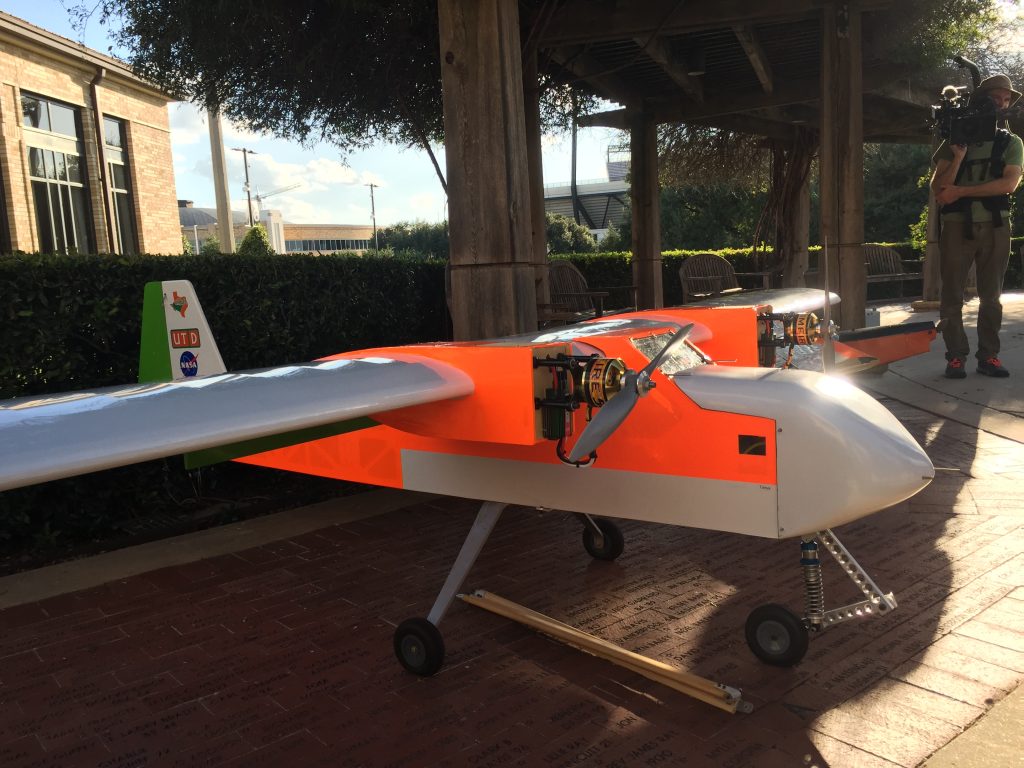 Here's the link to some pictures of our October 6th "Meet the Drones" Mixer featuring the squadron from University of Texas at Dallas.
Here's the link to some pictures of our October 6th "Meet the Drones" Mixer featuring the squadron from University of Texas at Dallas.
Thanks to TCU's Dr. Mike Slattery for hosting the public debut of our North Texas CLEAN Air Force – an exciting new effort combining citizen know-how with academic expertise to better help us identify DFW air pollution problems. Representatives from TCU, UTA, UTD, UNT, UNTHSC were on site. Thanks as well to all the supporters and curiosity-seekers who showed up to see the show.
This was the first of what we hope will be a series of such events around North Texas to show off the capacity and potential of this new tool for citizens. Stay tuned for news on when we'll be coming to a campus near you.
Mid-Day Update: Drones are Only One Part of Our Ambitious Project
Keep 'Em Flying
So far, contributions from our supporters have got our drone out of the hanger and into the air.
Now we need to get it above cement kiln and coal plant smokestacks we want to monitor. Help us gain monetary altitude.
This "Giving Day," Downwinders is trying to raise $6500 to fund a full 72 hours of airborne investigation by our pollution-sniffing drones.
From 6 am to 12 Midnight tonight, contributions of just $25 or more to Downwinders can get matched or expanded by the Communities Foundation of Texas.
Not only does your donation go further today, it also helps us fund new projects like our North Texas CLEAN Air Force.
But citizen-owned drones are only one part of a larger, more ambitious air quality monitoring project now taking shape in DFW.
Along with our academic partners in a new Air Research Consortium, we want to establish a region wide network of hundreds of stationary and mobile e-sensors that can give you better and more nuanced air quality information.
We want to take over the State's job – which it isn't doing very well anyway. The first step for us is getting our drones up in the air and doing research.
One hour of drone flight time costs $90. A full 72 hours in the air costs about $6500. That's our goal today.
And then there's this…..
We just won a fight it took 15 years to win
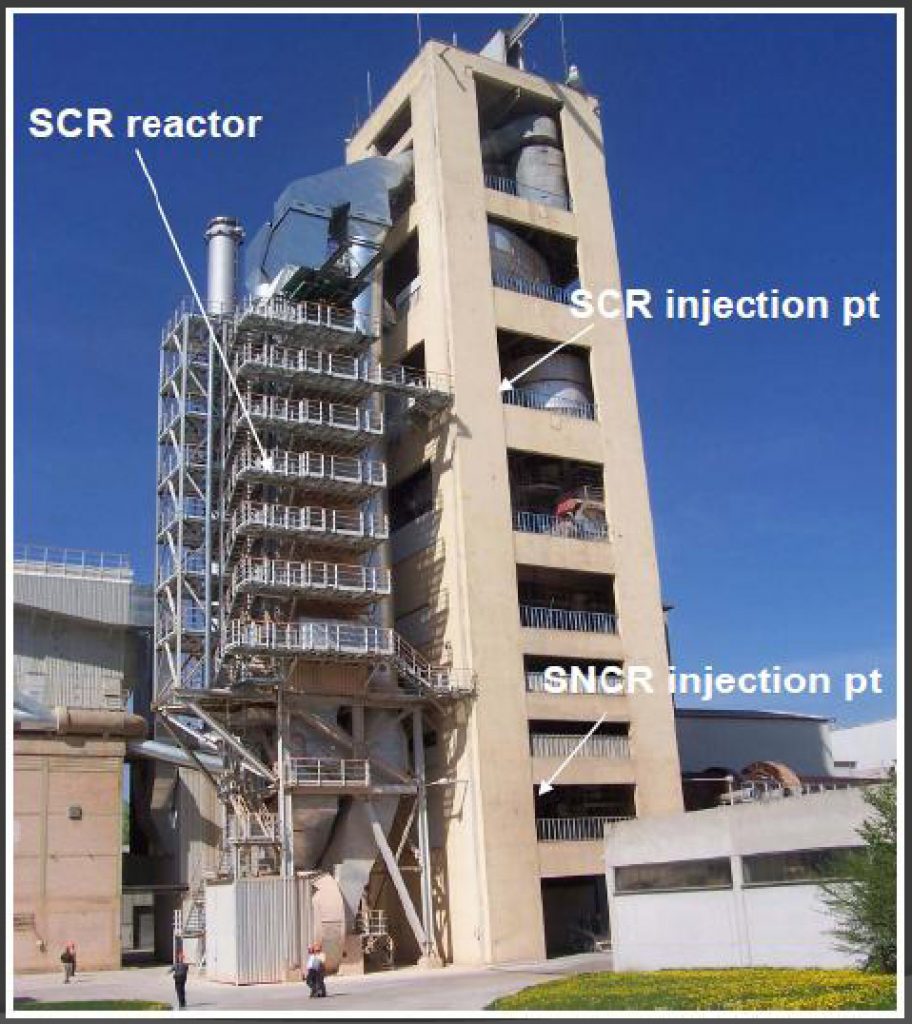 After 15 years of hard work we finally saw the installation of a state-of-the-art air pollution control system in one of thethree Midlothian cement plants this month.
After 15 years of hard work we finally saw the installation of a state-of-the-art air pollution control system in one of thethree Midlothian cement plants this month.
It could reduce smog pollution from the plant's kiln by 80-90%.
Only your support enabled us to stick around and follow-though on this goal.
WE CAN'T DO THIS WORK WITHOUT YOU

